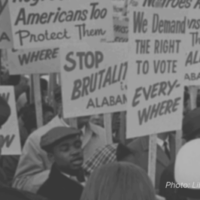Following is a statement from Rebecca Dixon, executive director of the National Employment Law Project:
“Today, in a major victory for workplace justice and civil rights, the Supreme Court ruled in Bostock v. Clayton County, Georgia and the companion cases that Title VII of the Civil Rights Act of 1964—the federal law that prohibits discrimination on the basis of sex and race—also protects lesbian, gay, bisexual, transgender, and queer workers from discriminatory firing. The Court’s ruling effectively extends workplace anti-discrimination protections to the 28 states whose civil rights laws have failed to protect all LGBTQ+ workers.
“This is a watershed moment in the struggle for LGBTQ+ rights. It is especially important for Black, Latinx, Indigenous & other LGBTQ+ workers of color, who face the highest rates of employment discrimination among LGBTQ+ people, including being doubly discriminated against for both their racial identity and their LGBTQ+ identity.
“Today’s victory belongs to a long line of LGBTQ+ workers and movement elders and to the plaintiffs of these cases, including the late Aimee Stephens. The victory also belongs to the legal team which included two trans lawyers, Chase Strangio and Gabriel Arkles – a team that so brilliantly argued these cases at every step. This victory was possible because of the global LGBTQ+ movement, and especially Black transgender women who have always led the way, and who are still fighting every day for all of our rights and liberation.
“To be clear, there is much more the federal government must do to ensure this ruling truly protects LGBTQ+ workers, and we must be honest about the limits the Supreme Court has previously placed on this important protection. In multiple cases, and most recently Epic Systems Corp. v. Lewis, the Supreme Court has allowed corporations to impose forced arbitration requirements and class action waivers on workers—robbing workers of their right to unite and enforce their rights before judges and juries. The result: 56% of nonunion private-sector workers cannot enforce Title VII’s protections before a judge or jury, including 59% of Black workers, nearly 58% of women workers, and 64.5% of workers in low-paid jobs.
“This means the very people in the LGBTQ+ community who need Title VII’s protections the most are largely barred from seeking any effective legal recourse for discrimination, wage theft, and other employment violations. Faced with forced arbitration requirements, most employees simply never file claims at all, directly undermining Title VII’s ability to eradicate harassment and discrimination against LGBTQ+ workers.
“To ensure the protections of Title VII can be fully realized by all LGBTQ+ people, Congress must pass the Forced Arbitration Injustice Repeal Act to correct the limits previous Supreme Court rulings have placed on LGBTQ+ workers’ rights. Congress must also pass the Equality Act, which both confirms the protections recognized by the Court today and adds additional protections for LGBTQ+ people from discrimination in public accommodations and federally funded programs.
“Both the Equality Act and the Forced Arbitration Injustice Repeal Act were passed by the U.S. House of Representatives in 2019, and the U.S. Senate has yet to take any action on either bill.
“Even as we rightfully celebrate this victory this Pride month, it is devastatingly clear how far we have to go to truly build a just and safe world for LGBTQ+ people. This weekend, thousands of people around the country marched for Black trans lives and held vigils for two Black trans women who were killed this week: Dominique “Rem’mie” Fells and Riah Milton. Their deaths are tragedies that never should have happened—Black trans women’s lives matter and the labor movement must put its full weight behind their fight for equality and liberation—not just at work, but everywhere.”




